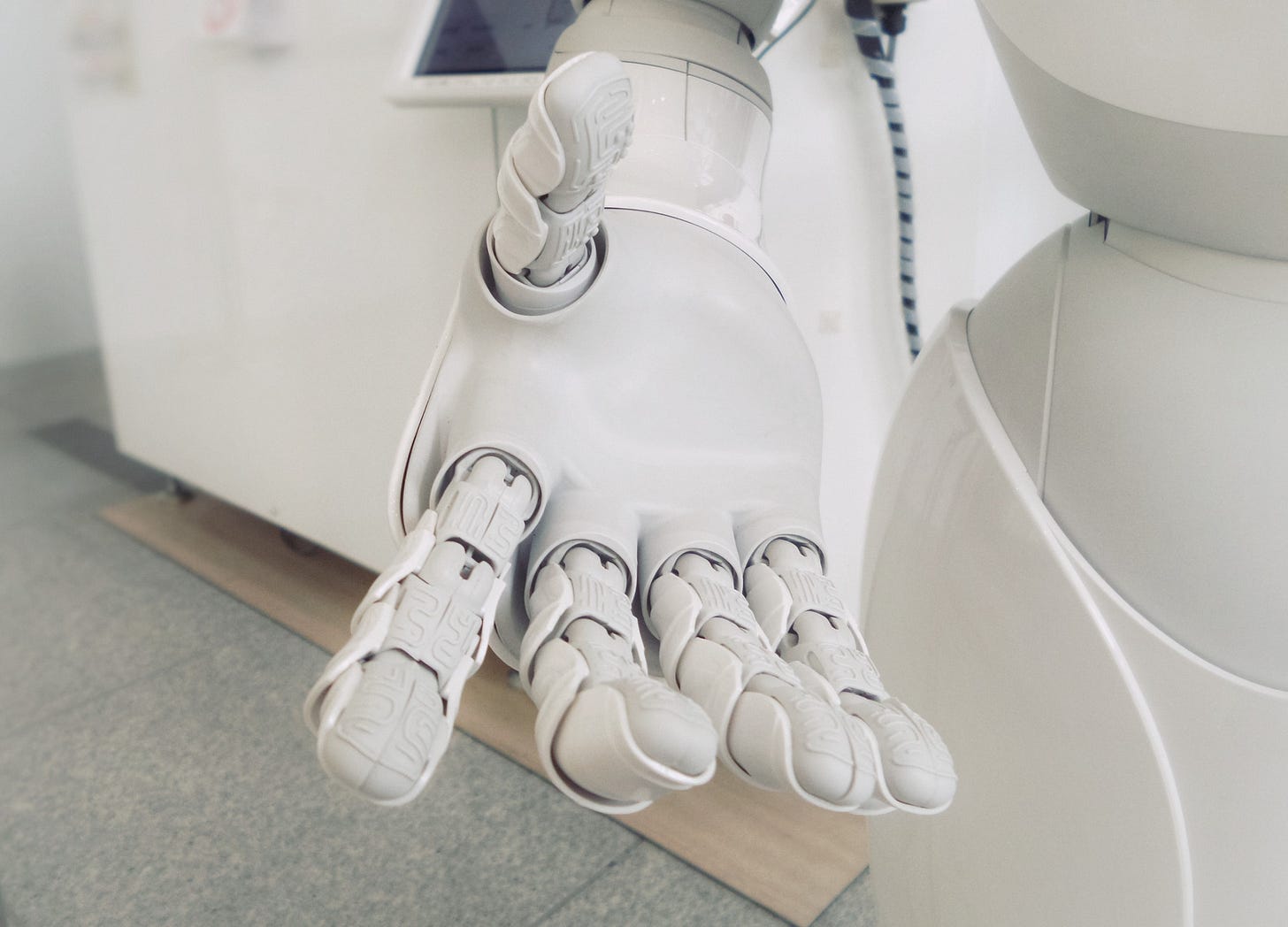What are you working for?
We cannot out-think the robot…
We cannot out-think the robot…

Photo by Franck V. on Unsplash
Over the past decade, the global unemployment rate has done something quite interesting.
It has gone down — from 5.6% in 2009, to 5.0% in 2019.
However, in contrast to the global average, global youth unemployment has marginally risen (12.9% to 13.2%).
Which makes global youth unemployment nearly three times greater than that for adults. Add in the fact that some 1,500 million workers are in unstable jobs, with at least another 114 million workers living in extreme poverty, then quality working lives will be at a premium for all young people.
That simple fact should be of concern to anyone interested in the stability of global society.
Because if youth unemployment doesn’t benefit when there is global decline in overall unemployment, then when will it benefit?
If educationalists cannot hold out the prospect of gainful, secure employment to their students, then what is the purpose of education?
End of Work?
Predictions regarding the ‘end of work’ have been around for some time.
The French philosopher, Andre Gorz, argued in his seminal book, ‘Paths to Paradise’ (1983) that work would in the future need to be rationed; with everyone doing a little, no one doing a lot.
This thesis fitted well with the late 20th century concept of the ‘leisure society’; a world of technological advancement in home and at work, leaving humankind with much more time to spend watching movies, visiting Disneyland, or simply going for a jog. However, by the end of the 20th century, economists such as Jeremy Rifkin and influential US politicians such as Robert Reich, were becoming much less optimistic about the social and economic impact of the ‘Third Industrial Revolution’; a world without mass secure, employment.
‘We are entering a new age of global markets and automated production. The road to a near-workerless economy is in sight. Whether that road leads to a safe haven or a terrible abyss will depend on how well civilization prepares for the post-market era that will follow on the heels of the Third Industrial Revolution.’ (Rifkin, 1995, p.292)
During the last 25 years we’ve experienced the Third Industrial Revolution and are now heading rapidly into the Fourth. Global society has not broken down. The ‘abyss’ has been avoided, so far, and indeed the burgeoning global middle class now dominates and drives economies from China to Brazil.
In which case we can all relax, and book that trip to Disneyland, Tokyo, confident that our job will still be waiting for us when we get back?
Well, not quite.
Jobs under Threat?
You don’t need me, or indeed anyone else to tell you that Artificial Intelligence is no longer just around the corner, but already in your office and sitting room. How close it is to actually sitting in your office chair is the big question.
But it is close.
The first wave of AI impact on jobs is already happening; wiping out any job which is repetitive and easily done by a machine. So basically, we are talking about factory work. Many thousands of factory workers (mostly male) are already sitting at home imagining a life without full time, or indeed any, employment.

Photo by Orlando Leon on Unsplash
Next in line to go will be those jobs which require some level of human ingenuity but not enough to stop a machine learning how to do it. For example, most types of driving jobs.
So, don’t plan a career as a lorry driver.
The third wave will be when AI becomes a partner in a job, not necessarily removing the job for a human, but becoming a human’s working assistant. This is already happening in teaching, medicine, hospitals, hotels, restaurants, banks, finance, and in theory could spread to any profession. To what extent this will remove jobs or simply enhance the effectiveness of existing jobs, we don’t really know.
But we are soon to find out.
Of course, given that many serious commentators have predicted the end of work over the past half century and yet global unemployment continues to decline, then one can be accused of ‘crying wolf’. Not according to Daniel Susskind:
‘If those who worried in the past about the future of work were wrong to be concerned, then surely those who worry today are wrong to be anxious, too? Yes, people did tend to find work after being displaced by technology — but the way this happened was far from being gentle and benign.’ (2020, p. 18)
As Susskind argues, even if AI doesn’t wipe out employment, it is most definitely going to change it.
‘Technological change may affect not only the amount of work, but also the nature of that work. How well-paid is it? How secure is it? How long is the working day, or the working week? What sort of tasks does the work involve? (p. 21)
Already I can see that impact here in Thailand. Thai factories are not closing, but they are replacing thousands of humans with robots. And what are many of these ex-factory workers doing? They are working for Grab and FoodPanda on zero-hours contracts delivering restaurant food on their scooters to middle-class families.
Implications for education
Education works on hope. It is all about promise.
Work today for tomorrow. Build your knowledge and secure your place in society. Deferred gratification. Without hope why become educated? Why bother with the expense of university? The whole contract between teacher and student resides on this singular assumption: the effort will pay off.
Susskind has a frightening scenario, at least for educationalists, within which this absence of hope is powerfully contextualised:
‘When confronted with the threat of technological unemployment, the most common response from those who think about the future of work…is that we need more education…the problem is [therefore] ultimately a skills challenge…For the moment, this is indeed our best response, and the most pressing task is figuring out what “more education” actually means…However, as time goes on and machines become ever more capable, education will be of diminishing help. The idea that education can indefinitely solve the employment problems created by technological progress is pervasive and largely unchallenged; it is also a big mistake.’ (p. 154)
What I find disturbing about this quote is that I sense it is presenting an accurate if brutal appraisal of education and work.
We cannot out-think the robot. We cannot out-perform the robot.
We are less reliable and more-costly than a robot. And even with those skills assumed to be innately human (e.g. creativity, empathy and emotional intelligence) as Susskind argues, the robot will simply bypass them, reinventing the job to match its own unique abilities.
Which raises a simple question: If education cannot offer hope to the millions of young people expecting, indeed demanding a future of secure pensionable, life-long employment, then as an educationalist, what are you working for?
Implications for Educationalists
I offer no answers to this conundrum. Better brains than mine are struggling with it. But I do know this, if we educationalists are to stay relevant to this and future generations, then we have to change the narrative.
We cannot change the politics, and we cannot change the education system, well, not fast, but we will have to change immediately how we present the future to our students.
We cannot in all honesty continue to promote a narrative of full-time careers for life. Professional identities will have to be entrepreneurial, fluid and flexible.
People will experience serial careers, not a singular one.
Nor can we pretend that by becoming ‘global citizens’ with all the attributes such entails will our students be the ‘leaders of the future’. For one thing, most will have no one to lead. We cannot even assure them of a job after university. And as for being middle class for life, well maybe. But growing numbers of educated middle-class millennials are now finding they cannot afford to buy a house, even with a full-time job.
One thing I have come to learn about Generation Z is that they appreciate honesty and openness. If we educationalists present a world which no longer exists, a future which is never going to happen, then not only will our students never forgive us, we should never forgive ourselves.
We need a new educational narrative for a new age.
And while we are working out just what that narrative is going to look like* we educationalists might also consider it a good idea to rethink the whole aims and purposes of education in a world where people no longer find meaning in work and where whatever work might be available is demanding, invariably poorly paid, intensely performative and highly insecure.
By Dr Stephen Whitehead (opinions are author’s own)
*Any narrative might benefit from aligning itself with Sir Winston Churchill’s observation about education and expectations: ‘Scarcely anything material or established which I was brought up to believe was permanent or vital, has lasted. Everything I was sure or taught to be sure was impossible, has happened.’ (W.S.Churchill, ‘My Early Life’, 1930, p. 81)
references
Susskind, D. (2020) ‘A World Without Work’. Metropolitan Books
Gorz, A. (1983) ‘Paths to Paradise’. Pluto
Rifkin, J. (1995) ‘The End of Work’. Tarcher Putnam

